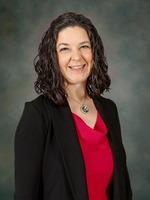

Universally Design Your Professional Learning (UDL for PD!) |
Explore and create : Creation lab
Katherine Goyette
Universal Design for Learning (UDL) celebrates variability and calls upon teachers to take a proactive approach to designing experiences accessible for all students. What about our adult learners? Can we UDL our PD? Learn tips and strategies for embedding UDL principles into professional learning experiences, even from a distance.
| Audience: | Coaches, Curriculum/district specialists, Professional developers |
| Skill level: | Beginner |
| Attendee devices: | Devices required |
| Attendee device specification: | Smartphone: Android, iOS, Windows Laptop: Chromebook, Mac, PC Tablet: Android, iOS, Windows |
| Topic: | Professional learning |
| Grade level: | PK-12 |
| ISTE Standards: | For Coaches: Learning Designer
Empowering Leader
|
Backed by neuroscience, Universal Design for Learning guides educators in increasing access for all learners. Why limit this research backed framework to student learning? In this session, participants receive an overview of the UDL framework, experience UDL as a learner, and hear stories of proven ways Tulare County Office of Education infuse UDL principles into professional learning experiences offered to educators to maximize effectiveness and promote an inclusive environment for adult learners.
Participants explore each portion of the UDL framework based on their choice of varied multimedia options. These include the affective network (providing multiple means of engagement), the recognition networks (providing multiple means of representation), and the strategic networks (providing multiple means of action and expression). Each of the aforementioned brain networks will be activated during the session, with tips for replicating this in professional learning sessions regarding any topic.
Participants will have the opportunity to consider the varying needs of an upcoming professional learning experience they are designing, and develop a plan to infuse UDL principles into this experience. Feedback from participants in workshops I have led at my county office reveals the success of infusing UDL into professional learning sessions. Participants have thanked me for including closed captioning during the presentation, offering choice and individual exploration time, and promoting multiple means of action and expression in demonstrating understanding. In my follow-up job embedded coaching, I have seen educators and coaches alike implement these UDL strategies into their lessons for adult learners and/or students.
Topics addressed/agenda includes:
The Why:
Variability and the Myth of Average (10 minutes)
Research regarding Adult Learning (5 minutes)
Activity - Mapping the Edges (Considering the Variability of our Adult Learners) (15 minutes)
The What:
UDL Framework/Research - Choice Based Exploration Opportunities for Learning (20 minutes)
The How:
UDL in PL Examples/Learning from our Experience (15 minutes)
Apply Learning:
Activity:
Predict, Overcome, Plan (Participants plan ways to infuse UDL principles into an upcoming PL session) (20 minutes)
Represent Learning:
Participants Share Learning in Collaborative Setting (20 minutes)
According to Todd Rose, director of the Mind, Brain, and Education program at the Harvard Graduate School of Education, science reveals that the "average" learner is a myth. If each human being is an individual, with varying needs, it follows that we must reject a one-size fits all approach to designing learning experiences.
The research based Universal Design for Learning guidelines, based on a foundation of neuroscience, gives leaders and coaches strategies for preparing professional learning experiences that celebrate variability and increase access by providing multiple means of engagement, multiple means of representation, and multiple means of action and expression. In their book "Universally Designed Leadership: Applying UDL to Systems and Schools", Katie Novak and Kristan Rodriguez reveal the importance of utilizing UDL principles in professional learning experiences for educators.
UDL also supports Knowles' theory of andragogy (adult learning). Knowle indicates that adult learners learn best when they: know why they are learning something (UDL principles that activate the affective networks), learn experientially, approach learning as problem solving, and see immediate value (UDL calls for relevance, value, and authenticity).

Katherine Goyette is an author, learner and educational leader who advocates for inclusive educational opportunities for all students within the communities they reside. In her role as the educational consultant for technology and integrated studies for the Tulare County Office of Education in California, Goyette engages educators in active professional learning sessions, conducts in-class coaching, supports district strategic planning, and serves as member of regional and statewide collaborative committees on digital learning and computer science. She believes in relationships with those she serves, and ensures she’s in classrooms with teachers and students throughout the year. Goyette is co-author of The Complete EdTech Coach: An Organic Approach to Supporting Digital Learning. She was the primary writer for California’s inaugural Computer Science (CS) Standards, and advocates for increased student access to high-quality CS, particularly in historically underrepresented subgroups. Goyette is the founding president of CSTA-California Central Valley; a board member for ISTE affiliate CVCUE; and created siteleadersconnect.org, a global network of innovative leaders. Goyette has been a keynote speaker, featured presenter and panelist for organizations across the globe on topics including the future of education, pedagogically sound edtech integration CS, project-based learning, universal design for learning and social-emotional learning. She holds a master’s in educational leadership and administration. Her certifications include: Google Certified Trainer and Innovator, Youth Mental Health First Aid, Dare to Lead, Newsela Certified Educator, Apple Teacher, Microsoft Innovative Educator and PBS Learning Media Digital Innovator. She has also worked as an administrator, coach and teacher in California’s Central Valley.